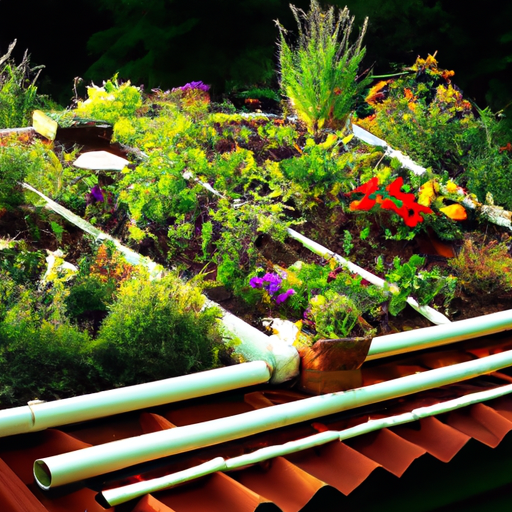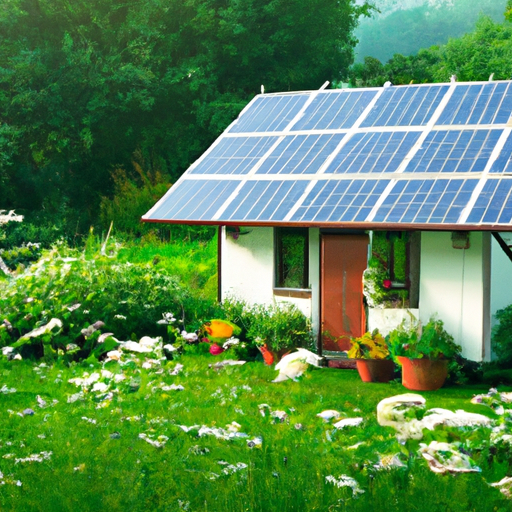As an Amazon Associate I earn from qualifying purchases.
Have you ever wondered what it would be like to live off the grid? To disconnect from the hustle and bustle of city life and rely solely on your own resources? Well, you’re in luck! In this article, we’re going to delve into the world of off-grid living and explore what it’s all about. Whether you’re a nature enthusiast, an environmentalist, or simply curious about alternative lifestyles, there’s something for everyone to learn in this beginner’s guide to off-grid living.
Living off the grid essentially means being self-sufficient and cutting ties with traditional utilities such as electricity, water, and gas. It involves generating your own power through renewable energy sources like solar panels or wind turbines, collecting rainwater or using a well for your water needs, and even creating your own compost and growing your own food. This lifestyle allows you to reduce your carbon footprint, embrace a simpler way of living, and connect more closely with nature. In the following paragraphs, we’ll dive deeper into the various aspects of off-grid living and provide you with practical tips and advice on how to get started. So, if you’ve ever dreamt of living a more sustainable and self-reliant life, keep reading to find out more!
What is Off-Grid Living?
Definition of Off-Grid Living
Off-grid living refers to a lifestyle where individuals or families live independently from public utilities and services. This means relying on self-generated sources for energy, water, waste management, and food production. It is a way of life that encourages sustainability, self-sufficiency, and a connection to the natural world. Off-grid living can be a fulfilling and rewarding experience, but it also requires careful planning, knowledge, and a willingness to embrace a simpler and more sustainable way of life.
Reasons for Choosing Off-Grid Living
There are numerous reasons why people choose to live off-grid. Some opt for this lifestyle for environmental reasons, as off-grid living reduces their carbon footprint and minimizes their impact on the planet. Others choose it for financial freedom, as it allows them to save money on utility bills and become more self-reliant. Additionally, off-grid living offers a sense of independence and freedom, allowing individuals to disconnect from the stresses and demands of modern society and reconnect with nature. Lastly, some people simply find joy and fulfillment in the challenge of living sustainably and off the grid.
Essential Factors for Off-Grid Living
Location and Land Requirements
Choosing the right location is crucial for successful off-grid living. Access to sunlight, water sources, and a suitable climate are all important factors to consider. Additionally, you will need to ensure that you have enough land to accommodate your off-grid systems, such as solar panels, wind turbines, or gardens. It’s also important to check local regulations and zoning laws that may impact your ability to live off-grid.
Energy Sources
Off-grid living requires alternative energy sources to power your home. The most common options are solar power, wind energy, and hydroelectric systems. Solar power systems utilize sunlight to generate electricity through solar panels, while wind energy systems harness the power of wind through turbines. Hydroelectric systems, on the other hand, generate electricity by utilizing water flow. It’s important to assess your energy needs and the availability of these resources in your chosen location before deciding on the best energy source for your off-grid home.
Water and Waste Management
Off-grid living also requires you to consider alternative solutions for water and waste management. Rainwater collection and filtration systems can provide a sustainable source of water for drinking, cooking, and cleaning. Greywater recycling systems can be implemented to reuse wastewater for irrigation purposes. Composting toilets offer a eco-friendly option for managing human waste, while septic systems can be used for more traditional waste disposal. It’s important to carefully plan and implement these systems to ensure a sustainable and efficient use of resources.

Building an Off-Grid Home
Choosing the Right Materials
When building an off-grid home, it is essential to choose the right materials that are environmentally friendly, energy-efficient, and durable. Opt for materials that have a low environmental impact and are sourced sustainably, such as bamboo, reclaimed wood, or recycled materials. Additionally, ensure that the materials used are suitable for your location’s climate and can withstand the elements.
Designing for Energy Efficiency
Designing an off-grid home with energy efficiency in mind can greatly reduce your energy needs and increase the effectiveness of your renewable energy systems. Consider incorporating passive solar design principles, such as large south-facing windows for natural light and heat, and proper insulation and ventilation to reduce the need for heating and cooling. Opt for energy-efficient appliances and consider using natural lighting and ventilation wherever possible.
Implementing Sustainable Technologies
Off-grid living provides an opportunity to implement sustainable technologies that can further enhance your self-sufficiency and reduce your environmental impact. Consider incorporating permaculture principles into your landscaping to create resilient and productive gardens. Explore alternative food production methods, such as aquaponics or vertical gardens. Additionally, consider implementing rainwater harvesting systems, greywater recycling, and composting systems to maximize resource efficiency.
Setting Up Off-Grid Energy Systems
Solar Power Systems
Solar power systems are a popular choice for off-grid homes due to their reliability and versatility. Solar panels capture sunlight and convert it into electricity that can be used to power your home. The amount of solar panels required will depend on your energy needs and the availability of sunlight in your location. A battery storage system can also be implemented to store excess energy for use during periods of low sunlight.
Wind Energy Systems
If you live in a windy area, wind energy systems can be a viable option for off-grid living. Wind turbines convert the kinetic energy of the wind into electricity, which can be stored in batteries for later use. Before installing a wind turbine, it’s important to assess the wind resources in your location and determine the feasibility and practicality of this energy source.
Hydroelectric Systems
If you have access to running water, hydroelectric systems can provide a consistent and reliable source of energy. These systems utilize the flow of water, such as a river or stream, to generate electricity. Hydroelectric systems can be complex to design and install, and may require permits or approvals from local authorities, so it’s important to research and consult professionals before implementing this energy source.
Battery Storage and Backup Generators
Off-grid living often requires a backup power source for periods of low energy production or emergencies. Battery storage systems can store excess energy generated by solar panels or wind turbines for later use. Backup generators, powered by diesel, propane, or natural gas, can provide additional power during extended periods of low energy production. It’s important to properly maintain and monitor these systems to ensure their reliability and longevity.

Water and Waste Management Techniques
Rainwater Collection and Filtration
Rainwater collection and filtration systems are essential for off-grid living, as they provide a sustainable source of water for drinking, cooking, and cleaning. Rainwater can be collected from rooftops and stored in tanks or cisterns. A filtration system, such as a sediment filter and activated carbon filter, can be used to remove impurities and ensure the water is safe for consumption.
Greywater Recycling
Greywater recycling systems allow you to reuse wastewater from household activities, such as washing machines, showers, and sinks, for irrigation purposes. By diverting and treating greywater, you can reduce your water consumption and maximize resource efficiency. Greywater can be filtered and reused in gardens or used to flush toilets, depending on your system design.
Composting Toilets
Composting toilets offer an environmentally friendly alternative to traditional flush toilets. They use organic materials, such as sawdust or peat moss, to break down human waste into nutrient-rich compost. Composting toilets require proper maintenance and management to ensure proper decomposition and odor control. They not only reduce water consumption but also provide a valuable resource for gardening and soil improvement.
Septic Systems
In areas where composting toilets are not feasible, septic systems can be used for waste management. Septic systems consist of a septic tank, where solid waste is broken down, and a leach field, where liquid waste is filtered and absorbed into the ground. Proper maintenance and regular pumping are required to ensure the functionality and longevity of septic systems.
Growing and Sourcing Food Off-Grid
Creating Permaculture Gardens
One of the key aspects of off-grid living is establishing sustainable and productive gardens. Permaculture gardens are designed to mimic natural ecosystems and maximize resource efficiency. By incorporating companion planting, agroforestry, and organic farming practices, permaculture gardens can provide a diverse range of fruits, vegetables, and herbs throughout the year. It’s important to choose crops that are well-suited to your climate and growing conditions to ensure a successful harvest.
Raising Livestock and Poultry
For those interested in self-sufficiency and sustainability, raising livestock and poultry can be a rewarding venture. Chickens, rabbits, goats, or even larger animals like pigs or cows can provide a source of meat, milk, or eggs. Before embarking on livestock or poultry raising, it’s important to research proper animal care, housing, and management practices. Be sure to check local regulations and zoning laws that may apply to livestock ownership.
Hunting, Fishing, and Foraging
Living off the grid often provides opportunities for hunting, fishing, and foraging. These activities can supplement your food supply and provide a connection to the natural world. It’s essential to research and comply with local regulations for hunting and fishing, as well as to practice sustainable foraging to ensure the long-term health and balance of ecosystems.
Preserving and Storing Food
preserving and storing food is essential for off-grid living, as it allows you to have a consistent food supply throughout the year. Canning, drying, fermenting, and freezing are common methods of food preservation. It’s important to have proper storage facilities, such as root cellars or cool pantries, to ensure the longevity and quality of preserved food.
Off-Grid Lifestyle and Self-Sufficiency
Minimalism and Sustainable Consumption
Off-grid living often goes hand in hand with minimalism and sustainable consumption. By reducing your reliance on external resources, you can minimize waste and unnecessary consumption. Adopting a minimalist lifestyle involves carefully considering your needs and wants, and prioritizing experiences and connections over material possessions. It’s important to practice conscious consumption and make informed choices to minimize your environmental impact.
Skills and Knowledge for Self-Sufficiency
Off-grid living requires a range of skills and knowledge to ensure self-sufficiency. Learning basic carpentry, plumbing, electrical, and gardening skills can empower you to build and maintain your off-grid systems. Additionally, acquiring knowledge in food preservation techniques, animal care, and sustainable farming practices can enhance your self-reliance and increase your resilience in an off-grid lifestyle.
Community Building and Networking
Living off the grid doesn’t mean living in isolation. Building a strong community and networking with like-minded individuals can provide support, knowledge exchange, and a sense of belonging. Joining local off-grid communities, attending workshops and events, and participating in online forums can connect you with individuals who share similar values and experiences. Collaborating with others can also lead to resource-sharing opportunities and the development of sustainable projects.
Challenges and Solutions for Off-Grid Living
Extreme Weather and Natural Disasters
Living off the grid may expose you to the challenges of extreme weather events or natural disasters. It’s important to design and build your off-grid systems with resilience in mind. Reinforcing structures, investing in backup power systems, and having emergency plans in place can help mitigate these challenges. Additionally, staying informed, having emergency supplies, and having access to communication channels can ensure your safety during such events.
Maintenance and Repairs
Off-grid living requires regular maintenance and repairs to keep your systems running smoothly. It’s essential to have basic tools and equipment on hand, as well as the knowledge and skills to address common issues. Regular inspections, cleaning, and upkeep of solar panels, wind turbines, water systems, and generators can prevent major breakdowns and costly repairs.
Isolation and Rural Living
Living off the grid often means embracing a rural or remote lifestyle. Although this offers peace, tranquility, and a closer connection to nature, it can also lead to feelings of isolation. It’s important to make an effort to connect with your local community, participate in social activities, and establish a support network. Utilize technology and online platforms to stay connected with friends and family outside of your immediate vicinity.
Legal and Regulatory Considerations
Before embarking on an off-grid lifestyle, it’s crucial to research and understand the legal and regulatory considerations that may apply to your chosen location. Zoning laws, building codes, and permits may impact your ability to pursue off-grid living. Consult with local authorities, professionals, or off-grid communities to ensure you are in compliance with the law and can enjoy your off-grid lifestyle without any legal challenges.
Costs and Financial Considerations
Initial Investment
Off-grid living often requires an initial investment to set up the necessary systems and infrastructure. This can include the costs of purchasing land, building or renovating a home, installing renewable energy systems, and implementing water and waste management systems. The total cost will depend on factors such as location, size of the home, energy needs, and personal preferences. It’s important to carefully budget and plan for these expenses to ensure a successful transition to off-grid living.
Operational Expenses
While off-grid living can provide long-term cost savings on utility bills, it is not without ongoing operational expenses. You will need to account for maintenance and repairs of your off-grid systems, as well as regular expenses for food, supplies, and other necessities. Additionally, consider the ongoing costs of fuel or propane for backup power systems, as well as any fees for maintenance or replacement of equipment.
Savings and Return on Investment
Over time, off-grid living can lead to significant savings and a return on your initial investment. By reducing or eliminating utility bills, you can save money that would otherwise be spent on electricity, water, and waste management services. Additionally, producing your own food can lead to savings on grocery bills. It’s important to calculate and track your savings to understand the long-term financial benefits of off-grid living.
Financial Assistance and Grants
Depending on your location, there may be financial assistance programs or grants available to support off-grid living initiatives. These can help offset the initial costs of setting up renewable energy systems or implementing sustainable technologies. Research local government programs, non-profit organizations, and community initiatives to explore available financial assistance options.
Conclusion
Off-grid living offers a unique and rewarding lifestyle that promotes self-sufficiency, sustainability, and a connection to the natural world. By implementing renewable energy systems, water and waste management techniques, and sustainable food production methods, individuals can reduce their environmental impact and become more self-reliant. While off-grid living comes with its challenges, careful planning, knowledge acquisition, and community building can help address these obstacles. Embracing a minimalist and sustainable mindset, and being mindful of legal considerations and financial implications, can contribute to a successful and fulfilling off-grid lifestyle. By taking the first steps towards off-grid living, you can embark on a journey towards greater self-sufficiency, environmental responsibility, and personal fulfillment.
As an Amazon Associate I earn from qualifying purchases.










